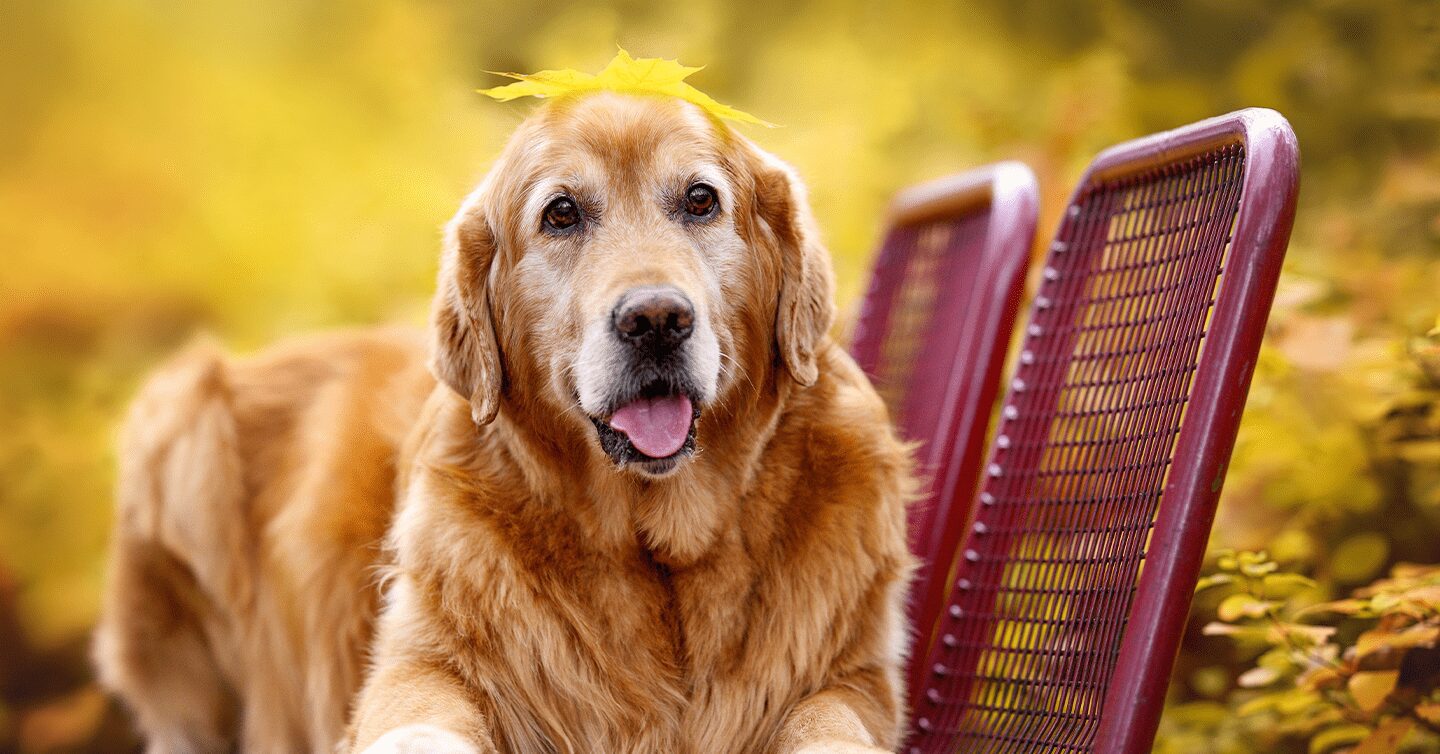Key Points
- Dogs can be considered “senior” between the ages of 6-11, the exact age will depend on their breed and size.
- As your dog ages, it’s normal to notice physical and behavioral changes such as mobility issues, weight changes, or simply more naps!
- Senior dogs require supportive routine care, so it’s a good idea to visit the vet regularly to get ahead of any health issues.
Although we wish our dogs could stay young forever, there comes a time when you start to notice some gray around their snout, a little less pep in their step, and wonder, “When is my dog considered a senior?”
Though you might suspect your dog is entering their golden years, it can be hard to tell when they officially make the transition from “adult” to “senior.” The answer can be a bit of a gray area (no pun intended!) so we turned to the advice of a veterinarian to help us navigate the later life stages of doggy hood.
How old is a senior dog?
According to Dr. Jamie Whittenburg (DVM), director of Kingsgate Animal Hospital, there is no universally accepted age at which a dog is a senior. However, there are some guidelines. “Generally,” shared Dr. Whittenburg, “small dogs are considered seniors at 10 years old, medium dogs at 8 years old, and large breeds at 6 years old.” This is because smaller dogs tend to live longer than larger dogs. Giant breeds such as Great Danes are especially prone to shorter lifespans.
What is that in human years?
According to the American Veterinary Medical Association, a dog’s first year of life is equivalent to 15 human years, while a dog’s second year of life is equivalent to nine years. After that, each dog year equals around five human years. That means a 6-year-old dog is around 40 human years old, a 10-year-old dog is around 60 human years old, and so on – though, this can still vary depending on a dog’s size.
Of course, this is all a little less useful if you’re not quite sure how old an adopted senior dog is. If you’re guessing the age of your dog based on their appearance, a veterinarian will be able to better estimate their age with a physical exam.
What are the signs of aging in dogs?
Much like humans, dogs tend to experience physical and behavioral changes as they age. Here are some of the most common ones pet parents see:
Gray hair
One of the first signs of aging is some gray fur around your dog’s muzzle. Their fur also may become thinner and its texture may change. Dogs aren’t so different from humans in this way!
Vision and hearing loss
Another common sign of aging is loss of hearing or vision. If your dog isn’t coming when called and/or seems to be bumping into objects, it’s a good idea to get their sight and hearing checked. This is a normal part of aging but is something you’ll have to be aware of to keep them safe and give them better day-to-day care. If you notice cloudiness in your dog’s eyes, ask your vet about the possibility of cataracts or glaucoma.
Weight changes
Weight gain is to be expected for most older dogs, however, some dogs also experience weight loss. This can come from something as simple as a decreased appetite or something more complex like an underlying health issue. Likewise, weight gain usually comes as the result of an older dog’s less active lifestyle. However, in some cases, weight gain can lead to serious health issues such as diabetes. If your dog is experiencing drastic weight changes, let your veterinarian know – they can tell you what’s normal and what’s not.
Sleep and mobility changes
As most mammals age, we tend to become less active and generally need more sleep. Dogs can be especially prone to losing a lot of their mobility. But don’t panic – if Fido isn’t fetching his favorite toy quite like he used to, that’s perfectly normal. He may just need shorter play sessions and more naps!
Behavioral changes
While your dog is physically slowing their pace of life, they may also display behavioral changes, such as a decrease in cognitive function or a change in mood. If your dog is becoming lethargic or aggressive, ask your veterinarian what some causes of the behavior change might be.
What are some common health problems in senior dogs?
While aging is as normal as it is inevitable, some health issues to watch out for with senior dogs include joint pain and a decline in oral health. These may be signs of osteoarthritis and periodontitis, which are treatable conditions but may worsen if there is no early intervention. According to Dr. Whittenburg, at least 80% of dogs over the age of 3 years are affected by periodontal disease.
Other health problems that are common for senior dogs include kidney disease, hip dysplasia, hypothyroidism, and cancer. In fact, according to the Veterinary Cancer Society, 50% of dogs over the age of ten will experience cancer.
Depending on what kind of dog you have, you’ll want to be aware of the signs of specific conditions. For example, certain breeds of dogs are more prone to health issues such as intervertebral disc disease or heart disease.
Care tips for senior dogs
Although it may be tough to see your pup slow down with old age, there are plenty of preventive measures you can take to preserve their health. Here are a few!
Adapt to changing dietary needs
A healthy diet is always important to your dog’s health and quality of life, but even more so as they age. It’s important to find dog food that is specific to senior dogs. Whether your dog is experiencing weight loss or signs of obesity, your vet can recommend diet changes and supplements that can help your senior pet be as healthy as possible.
Encourage regular exercise
Maybe there was a time when your furry friend couldn’t wait to go running in the park with you, and now they’d rather cuddle by your side. While that’s a perfectly normal behavioral change, providing your dog with regular exercise opportunities is still important. If your dog isn’t interested in running around the park like they used to, try other low-impact options like interactive toys or puzzles to get them on their feet.
Practice good hygiene
No matter what age your dog is, it’s never too late to start doubling down on their oral health and grooming. This means regular doggy tooth brushing, baths, and nail trimming. Good hygiene habits are important for aesthetics and comfort, but more importantly, they can help prevent illnesses like periodontitis.
Keep up with vaccines
Many people think vaccines are only critical for puppies, which is simply not the case. Don’t forget to keep up with your dog’s vaccines and parasite prevention even in their old age. They are still susceptible to parasites and illness!
Visit your vet regularly
This brings us to our final and most important tip for caring for a senior dog – keeping up with regular checkups. Every dog needs to visit their veterinarian at least once per year – and for seniors, this is especially true. Yearly blood work, intestinal parasite screenings, and thorough physical examinations can help detect and treat illnesses early on. If you suspect your dog is experiencing major health changes, ask your veterinarian if introducing biannual visits would benefit your dog.
Whether your dog has just entered their golden years or is on their way, know that age is just a number! So long as you provide a supportive lifestyle and keep up with preventive care at the vet, your dog can live a happy, healthy life, even in old age.
Most standard insurance plans cover the costs of unexpected accidents and illnesses, however, some providers also offer wellness packages that can help you pay for preventive care costs. Pumpkin’s Preventive Essentials is an optional non-insurance add-on benefit that can reimburse you for routine care costs such as annual exam fees, vaccinations, and parasite screenings for your senior pooch.
As for the rest of your pup’s health needs, Pumpkin Dog Insurance plans cover 90% of eligible vet bills for accidents and illnesses. Fetch a free quote today!




